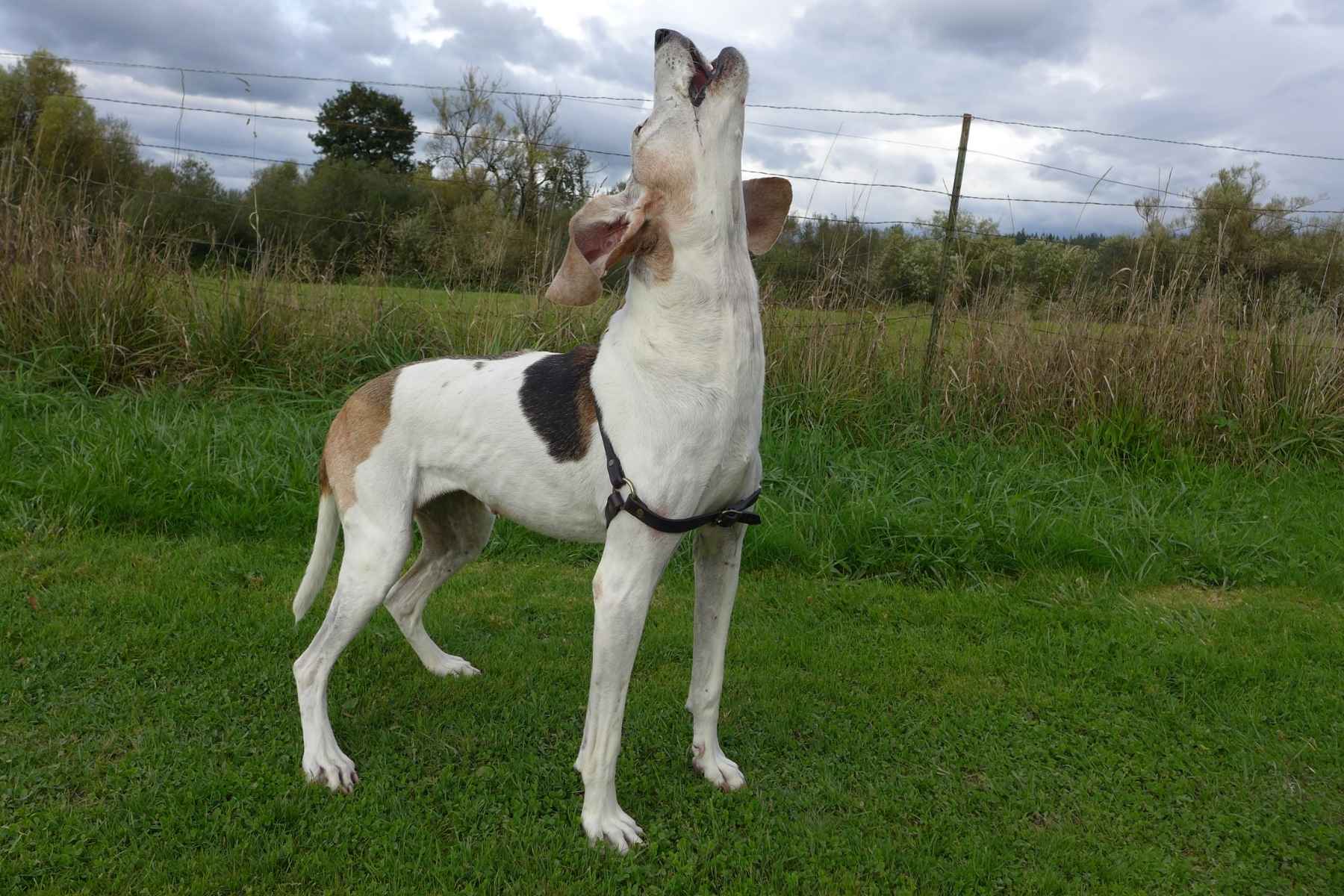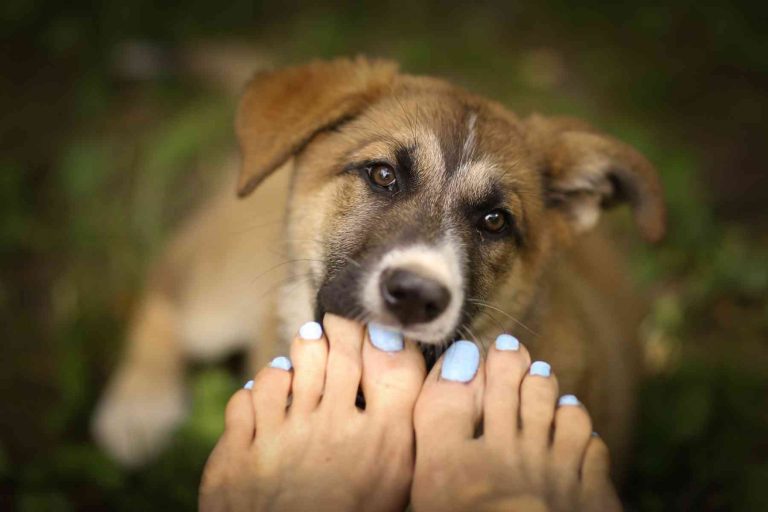Why Do Dogs Howl?

A dog’s howl is one of the most haunting and recognizable calls in the animal kingdom. However, you might be curious why exactly your canine friend does it.
Dogs howl for a wide variety of reasons, ranging from social bonding to expressing anxiety. If your dog does it excessively, it may require more enrichment or have a medical issue. Certain sounds can also trigger dogs to howl, such as music and emergency sirens.
Understanding what your pet’s howl means can be tricky at first. So to help, this article dives into why dogs do it and when it indicates a problem.
Reasons Why Dogs Howl
Howling is a remarkably complex behavior in canines. It can communicate everything from danger to territorial boundaries. And sometimes, they just do it for fun!
Here are the primary reasons why dogs howl:
- Attention: Since crying out is a great way to get our attention, many dogs howl for just that reason. Your pet may also do it to call you over to something they found.
- Stress: Some dogs get separation anxiety when their owner is away and start howling to cope. Your pup might also do it in response to perceived danger, like a raccoon in the yard.
- Mark territory: In nature, howling is often a territorial call for canines. It’s also a method of letting their pack members know their location.
- Sound triggers: Several sounds can tickle your pup’s natural urge to cry out—especially vehicle sirens and other dogs howling.
- Bonding and fun: Howling is a social activity among canines. As a result, it’s common for dogs to do it when their owners sing aloud or play with them.
- Medical issues: Your pet might be calling out due to pain or discomfort. Schedule a visit if you can’t find any other reason for them doing it.
Is It Normal for Dogs To Howl?
Howling is a natural way for dogs to communicate in certain situations—such as when they’re excited while playing or notice something in the yard.
However, there are times when the sound may indicate something is wrong.
For example, your dog might howl out of distress due to health problems. Animals instinctively hide when they don’t feel well. So if your pup goes under your bed and then starts hollering, consider a vet visit.
Additionally, your furry friend might do it to try to warn you of danger.
Canines are naturally loyal and protective creatures. As a result, they may launch into a dramatic howl when seeing a fox or intruder in the yard. Similarly, some dogs may cry out if they think another pet is in harm’s way.
Even when your pet howls playfully, think carefully about how you react. Dogs are clever and quickly pick up on what gets their owner’s attention. So if you reward the behavior too much, your furry friend may start howling constantly.
Ways To Stop Your Dog From Howling
There are times when dogs can get excessive with their howling. For example, your pup might wake you up at night every time they hear a breeze. Or maybe they get set off by the sound of nearby cars.
Either way, there are thankfully plenty of ways to discourage the behavior.
Below are some ways to get your dog to howl less:
- Reinforce good behavior: Reward your pup with a little snack when they go a while without howling. Also, give them a treat if they ignore a howling trigger, such as a police siren.
- Provide enrichment: When dogs lack stimulation, they may start howling out of sheer boredom. To prevent that, spend more time bonding with your furry friend. When you’re busy, give them toys to play with in the meantime.
- Don’t reward howling: Whenever your pet canine howls, resist giving them treats for a short period. Otherwise, they may associate the behavior with a reward.
- Training: Dogs can learn to quiet down on command, similar to how you teach them to sit. Reward your pet whenever they listen—and don’t punish them if they fail.
Remember that dogs sometimes howl because they feel distressed or in pain. So before correcting the behavior, make sure there’s nothing wrong with your pup.
Is It Good To Let Your Dog Howl?
Believe it or not, letting your dog howl is generally a great idea—assuming your family can tolerate the noise.
As mentioned earlier, howling is instinctive for dogs. Canines do it in the wild for reasons ranging from socialization to marking territory. So when your dog sings along with you, it’s their natural (and adorable) way of bonding.
Furthermore, many pooches howl as a way of releasing pent-up energy. Hound dogs, in particular, are taught to bay and howl when they catch prey. As a result, letting your beagle occasionally sing their heart is an excellent form of enrichment.
That being said, there are some exceptions to the rule.
Firstly, you want your dog to howl for the right reasons. If they seem distressed or aggressive while doing it, don’t encourage the behavior.
Also, ensure that their calls aren’t bothering anyone else. While you might find your pet’s howls cute, your neighbor may disagree.
Ways To Get Your Dog To Howl
If the noise doesn’t bother you, consider encouraging your dog to howl occasionally. In the right circumstances, it’s an excellent way to bond. Plus, it gives your canine enrichment by reinforcing natural behaviors.
Here are methods to get your dog to howl:
- Sing your heart out: Singing is like the human equivalent of howling. And since your canine sees you as part of their pack, they’ll want to join in.
- Dog howls: The sound of other dogs howling is an excellent way to encourage your dog to do it too. You can use another pet or a compilation video online.
- Play music: Many high-pitched instruments make canines want to cry out playfully. Wind-based instruments, like harmonicas and saxophones, are particularly effective. With some training, your dog can even learn to howl in tune!
- Whistle: Like wind instruments, a loud whistle can get your pet in a howling mood. However, this probably won’t work if you already use whistling to call your dog.
- Training: Remember how you can teach your dog to stop howling on command? Well, the opposite is true as well! Reward your canine with a treat every time they listen for the best results.
The high-pitch tone of ambulance and tornado sirens may also cause your dog to howl. However, if you use those sounds, make sure your furry pal doesn’t seem distressed.
Understanding Your Dog’s Howls
Sadly, there’s no way for humans to understand the language of dogs entirely—at least not yet. However, some signs can help you tell a happy howl from a sad one.
Below are some ways to decipher your pooch’s howling:
- Location: Where is your dog howling? If they’re doing it at the window, the chances are that they just saw someone walk by. But if your pup howls in the bathroom or closet, they probably feel sick or scared.
- Baying: Baying is a type of howl, but more aggressive and barky than usual. If your dog does it, it usually means they’re calling you to an animal they found. Generally, only hounds will bay.
- Body language: Playful, social howling is often accompanied by a wagging tail and relaxed posture. Meanwhile, howling with bared teeth and an erect tail usually indicates a warning.
- Tone: After a while, you may notice that your dog has different types of howls. Your dog might make frantic, low-pitch calls while they play. Meanwhile, drawn-out and whiny howls may indicate stress.
Do Some Dog Breeds Howl More Than Others?
Ever wonder why Huskies will howl regularly while Chihuahuas rarely do? As it turns out, some dog breeds tend to howl more often than others.
Below is a list of the types of dogs that are especially vocal:
- Alaskan Malamute
- Basset Hound
- Siberian Husky
- American Foxhound
- Finnish Spitz
- Bloodhound
- American Eskimo Dog
- Shetland Sheepdog (Sheltie)
As you can see, there are some common traits among canines that howl a lot. And the reason why has to do with their domestication and genetics.
Specifically, hunting dogs (known as hounds) are much more likely to howl. Humans raised these canines to call their owners when they found prey.
As a result, yours may start crying out when they see a squirrel or bird. But some canines also do it as a natural impulse.
Spitz breeds, such as Siberian Huskies, love howling. And it makes sense considering many of them are genetically closer to wolves than other dogs—particularly the Alaskan Malamute.
Spitz dogs are also the most likely to be sleigh and hunting dogs in arctic regions. As a result, their howl is sometimes invaluable for beckoning rescuers to hurt or stranded people.
Final Thoughts
Generally, dogs howl in response to certain sounds and to get their owner’s attention. However, they also may do it when suffering from health issues or feeling stressed.
As a result, consider a vet visit if your pup howls excessively for seemingly no reason.






